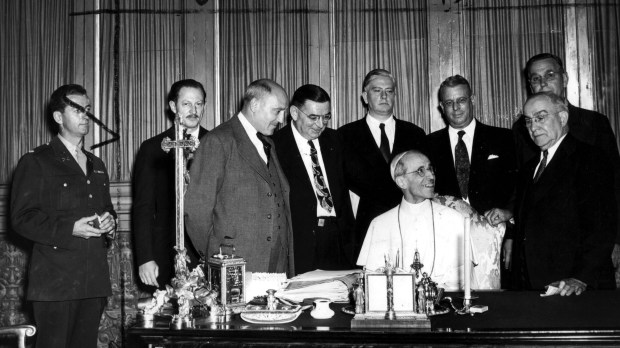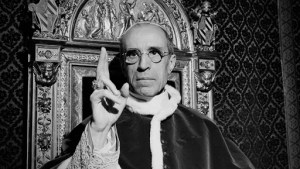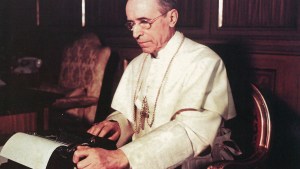The intentional revision of history due to bias can result in the loss of innocent lives. Mindful of this, one must question the research of historical events, and authors must be held to a high and accountable standard.
Several authors, such as David I. Kertzer, who recently published The Pope at War: The Secret History of Pius XII, Mussolini, and Hitler, and Suzan Zuccotti, author of Under His Very Window, claim the Vatican only helped baptized Jews during the Shoah. Critics of the Vatican fail to understand the context under which the Vatican was sometimes forced to operate deceptively. For example, it is well established that the term “Non-Aryan Catholics” is a code for Jews. The 1933 Concordat with Germany provided the Vatican this legal justification, enabling them to save tens of thousands of Jews using false baptismal papers.
Historians footnote their sources. They fail, however, when they do not translate documents accurately, considering the cultural and historical context within which they were written. This is especially true of Vatican diplomatic documents written in the unique language of “Vaticanese,” a mixture of multiple languages with subliminal messages.
A KGB disinformation campaign
An example of how perspective and life experience also inform how one views and records history is that of the Chief Rabbis of Rome. The two Chief Rabbis who lived through the war praised the actions of Pope Pius XII and the life-saving efforts taken by the Church. The current chief Rabbi of Rome, born after the war, scorns Pope Pius XII. This is likely the result of a massive disinformation campaign by the Soviet KGB in 1963 called “Operation Seat 12.” This plot was devised to destroy the reputation of Pope Pius XII and the Catholic Church, five years after the pope’s death, to destabilize Eastern Europe during the height of the cold war.
In their book Disinformation, Professor Ronald Rychlak and Lt. General Ion Mihai Pacepa expose this KGB tactic. The KGB sponsored the creation and performance of Rolf Hochhuth’s fictitious play The Deputy in 1963. The play was promoted internationally to disseminate its disinformation plan. It destroyed the previously positive reputation of the pope, and in 1964 it even won a Tony Award. This revisionist history continues to be expanded by many critical books and movies. Operation Seat 12, as this misinformation campaign is known, affected the world opinion of Pius XII and, to this very day, constitutes one of the worst character assassinations of the 20th century.
Historical records and the Apostolic Archives
When studying the history of the pontificate of Pius XII, it is essential to consider what possible motives may influence individual historians as they address these issues. For example, it would appear that many educated scholars missed researching hundreds of thousands of pages of WWII Church documents, which have been available since the end of the war. Important documents have been available in the archives of every diocese and every Catholic community worldwide. Unfortunately, some historians seem only interested in the Apostolic (Secret) Archives, located within the Vatican itself.
In 2006, Pope Benedict XVI opened the Apostolic Archives through 1939. Few critics have bothered to study these records, ignoring 2/3 of Eugenio Pacelli’s (Pope Pius XII’s) life. The world accuses him of silence. The truth is the pope planned to address the persecution of the Jews in a radio broadcast. The Allies sought assurances that the pope’s speech would not be delivered as planned. They understood that in doing so, Pius would also have to condemn the atrocities committed by the Soviets, thereby threatening the Allied coalition.
Denouncing Naziism
A thorough examination of the record would also include the devastating result of Archbishop of Utrecht Johannes De Jong’s denunciation of the Nazi’s arrest of the Dutch Jews. De Jong’s reading from a Pastoral Letter resulted in the acceleration of the Nazi plan against the Dutch Jews. Converted Jews were arrested first. Anne Frank and Edith Stein were killed as a result of this speech. Public condemnation of the Nazis would have been disastrous and cost many more lives, a lesson not lost on Pope Pius XII. Also significant and rarely cited is the American Ambassador’s March 1939 report to Washington about the “new pope’s” attitude toward Hitler and Pope Pius XII’s telegram to the Regent of Hungary to stop deporting the Jews.
Gratitude from the Jewish community
The true character of Pius XII is quite different from the fabricated accusations of antisemitism attributed to him. The level of Jewish gratitude from personalities who lived through the war is remarkable. However, many of their public statements are omitted to promote individual agendas and biases.
Some Jewish personalities who extolled the actions of Pius XII are:
- Golda Meir
- Albert Einstein
- Chaim Weizmann, First President of Israel
- Moshe Sharett, Second Prime Minister of Israel
- Raffael Cantoni, President of the Jewish Community of Italy
- Chief Rabbi of Rome Israel Zolli, who subsequently converted to Catholicism with his wife and took the names Eugenio and Eugenia to honor Pope Pius XII
- Chief Rabbi of Rome Elio Toaff
- Chief Rabbi of Palestine Isaac Herzog, who in 1944 came to Rome to thank the pope for his interventions in Romania
- Chief Rabbi of Egypt, Haim Nahum Effendi
- Rabbi Melchior of Denmark
- Rabbi Safran of Romania
- Nahum Goldmann, President of the World Jewish Conference
In March 1946, the Italian Jewish community erected a marble placard to honor Pius XII, which has since disappeared. In May 1955, The Israeli Philharmonic Orchestra of Holocaust Survivors traveled to Rome with conductor Paul Kletzki and, in gratitude, played for Pius XII. Jewish survivor Herman Herskovic wrote a defense of Pius XII in response to false accusations accusing him of being “Hitler’s pope.” The official biographer for Winston Churchill, British historian and Holocaust survivor
. Dr. Joseph Lichten, Director of the Anti-Defamation League Foreign Language Department, wrote favorably upon the death of Pius XII, praising his humanitarian efforts. Prominent Hungarian Jewish historian Jeno Levai, who lived through the war, commented on the contemporary criticism of Pius XII, “it’s a particularly regrettable irony that the one person in all occupied Europe who did more than anyone else to halt the dreadful crime and alleviate its consequences is today made the scapegoat for the failures of others.”False accusations of antisemitism
Despite objective evidence available within numerous archives, Kertzer falsely accuses Pope Pius XII of anti-Semitism. In 1933, Archbishop Eugenio Pacelli, the future Pope Pius XII, wrote to the Vatican about the dangers of anti-Semitism. Kertzer’s omissions suggest he failed to review the material documents of Pacelli, as Papal Nuncio in Germany from 1917 through The Zionist Organization, during which the creation of a Jewish homeland in Palestine was discussed. Drawing upon lessons from the past, Pacelli directly intervened to save the Jews of Palestine from the genocide suffered by the Armenians at the hands of the Ottoman Turks. He also tried to help Chief Rabbi Werner of Munich secure palm fronds to celebrate the Jewish holiday of Sukkot. In a moving piece published in London, then Chief Rabbi Zolli of Rome “expressed from the pulpit the thanks of the Jewish community for the aid extended to the Jews in Italy by the Catholic Church and clergy during the months of German persecution.”
Three weeks after the notorious events of Kristallnacht in 1938, Pacelli, in his role as Vatican Secretary of State, contacted the Nuncios around the world asking for visas to rescue approximately 200,000 Jews (“non-Aryan Catholics”) left in Germany. Kertzer fails to reference a 1939 letter where Pacelli offered help to the Jews of Poland by opposing anti-Kosher slaughtering laws. He also omits the May 1940 article in National Jewish Monthly, published by B’nai B’rith, featuring Pius XII on the front cover. The article goes on to praise him for hiring the Jews of Rome, who were fired because of the 1938 Italian anti-Semitic labor laws. A comprehensive review of the archives of many major publications, including the New York Times and the Palestine Post, does not reveal negative commentary about Pope Pius XII. On the contrary, the contemporary press only reflects positive reporting regarding his actions when Pope Pius XII and the Jews 1939-1958 is queried.
Even a cursory visit to the German archives would reveal the testimony of General Karl Wolff detailing a meeting with Hitler, who ordered him to develop an invasion plan of the Vatican (translation), during which
Pope Pius XII learned of this plan shortly before the arrest of the Roman Jews on October 16, 1943, yet he still acted to save as many of the 8,207 Jews in Rome as possible. Documents also readily available for review are the telegrams from Berlin, ordering the arrest and deportation of 8,000 Roman Jews as hostages to the work camp Mauthausen concentration camp rather than to the Auschwitz death camp. At the German Resistance Memorial Center in Berlin, critics would have discovered the Kaltenbrunner Report, accusing Pope Pius XII and his secretary Fr Leiber of being co-conspirators (translation) in the Valkyrie assassination attempt to kill Hitler.Pius XII approved of plots to topple Hitler’s regime
Mark Riebling’s book Church of Spies illustrates how Pius XII was aware and approved of each attempt to rid Germany of Hitler. Naturally, Pius XII held meetings in secret, during which he obtained guarantees from the Allies assuring the conspirators’ safety, and that the Allies would not attack Germany if Hitler were assassinated. This book is based entirely on Riebling’s research in the American and British Archives. You will not find one word in the Apostolic archives. Written information such as this had to be destroyed and held in extreme secrecy.
There is ample eyewitness testimony documenting the covert actions of Pius XII. Among these is the account of Msgr. Giovanni Ferrofino, who
. There he received double encrypted telegrams from the pope for delivery to General Rafael Trujillo of the Dominican Republic. Monsignor Ferrofino and Nuncio Archbishop Silvani traveled for two days to deliver the telegram request for 700 visas, to be renewed twice a year, from 1939 to 1945, or whenever a boat could be arranged, to transport Jews from Portugal to the Dominican Republic. Documents recovered from Vienna discuss problems getting Portuguese visas. , which provided cash and Vatican passports directly from the papal apartments to send Jews to Switzerland.When Pave the Way Foundation began researching this papacy in 2006, we discovered 2,335 wartime documents in Campagna, Italy, hundreds of pages of documents in Vienna, in Assisi, and communities in Rome, over 15 years before Pope Francis opened the Apostolic Archives. Many of these letters from all over Europe respond to Jews asking for help. The papacy responded to many letters by sending money from the “August Pontiff” for the care of the Jews.
Perhaps if Kertzer had researched the recently opened archives, he would not have been “flabbergasted” by the information he stated was hidden by the Vatican but was in fact published decades ago in the 1969-1974 Acts and Documents of the Holy See.
Additional omissions in contemporary research
In her research, Susan Zuccotti studied the archives of the German cathedral, Santa Maria dell’Anima in Rome. She failed, however, to discover the one document showing how the pope directly interceded through his nephew, Francesco Pacelli, to end the arrest of the Roman Jews at 2 pm on October 16, 1943, the day the arrests began. (translation) The papal intervention was further verified by Relator to the Causes of Saints, Fr. Peter Gumpel.
Zuccotti also omits a handwritten diary entry for 1943 (translation) by the Augustinian Nuns in Rome, stating, “The Holy Father has asked us to help the Jews.” Zuccotti also recounts an interview with Msgr. Aldo Brunacci in Assisi for her book. The Msgr. recounted events during which he was called to speak to Archbishop Nicolini, who held a letter and stated, “I have a letter from the Holy Father asking us to do everything possible to save the persecuted Jews.” Because Brunacci claims not to have read the letter himself, Zuccotti falsely concluded that there is no proof the letter exists and that Pius XII had nothing to do with the life-saving efforts in Assisi. The written request, which went to multiple dioceses in Europe, instructed the recipient to destroy the letter lest it fall into enemy hands.
Sixteen years before the opening of the Apostolic Archives, government reports, newspapers accounts, personal testimonies, and other evidence was available to attest to the efforts of Pope Pius XII and of the Church to save Jews. We have located and published over 76,000 pages of primary sourced material. The truth regarding the Papacy of Pius XII is available to anyone for unbiased review and study. It is for honest, open-minded readers to confront historical revisionists who profit from sensationalism, conspiracy-mongering, and bigotry.



